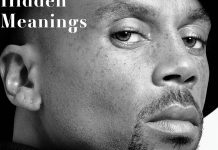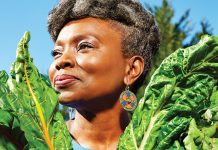In her family’s longtime home near Emory Village, Melissa Fay Greene, fifty-eight, reflected on her new book, No Biking in the House without a Helmet, and talked about the joys and pitfalls of parenting—and writing about it.
Was writing a memoir fun or tortuous? It was fun. I had been reluctant, nervous about it, embarrassed about it … I’ve written such serious books. And everyone’s writing memoirs. When people asked me what I was working on, I couldn’t even express what it was. I felt sheepish about it.
Did you have buy-in from the whole family before you started writing it? Yes. And once I got over the sheepishness of it, I saw what I had seen at the beginning: There were all these great stories here. That’s always been my divining rod. “Are there stories there? If you dig deep, will you find stories?” With every book that’s been the key. Because I love stories. I love to tell stories; I love to hear other people tell stories; I love to help other people tell their stories. It was absolutely the case that I was sitting on a treasure trove of stories here.
But then you have the issue of nine in-house editors. And people with veto power.
Did anybody exercise that power? Oh, sure. Sometimes surprisingly. Like one story I thought was very private, and very delicate. Originally I was never going to go anywhere near it. But then I thought, I’ll ask him. It was our surprise, surprise rendezvous with our son Sol’s birth mother. My husband and I were flabbergasted, because we had been told she was deceased. So that was a surprise. And it’s an amazing story. It was an amazingly poignant and loving moment. But do I write about that? So I asked Sol and he said, “Yeah.” It was fine.
But then there were things I hadn’t really thought would be a problem. I have a chapter in the book called Everything You Always Wanted to Know About Sex, But Couldn’t Spell, which was actually the first chapter of the book I wrote — just fooling around. My agent kept saying, “You’ve got all this stuff. Why don’t you try?” So I wrote this chapter about living with non-native-English-speaking boys — ages 12, 13, 14, and 14 — and the intersection of their budding pubescent interests with modern American technology and the things that were cropping up on my computer and on Amazon.com and in our cellphone bill and in our cable bill.
I ended up not using names. So I just say, “my son” or “a son.” I think it’s OK. Hopefully they’ll think it’s funny.
Humor plays a big part in your survival. Does everybody here have a great sense of humor? People are very funny here. They are very funny.
You don’t have any grandchildren yet, right? What kind of grandmother will you be? Fabulous! I’ve saved all the toys. You know, some of the kids say they want big families; others not. But all of them seem to feel that adoption will play a part in the creation of their own families.
How important is it that your children were exposed to world travel and other cultures early in their lives? I think it’s been incredible for them. Having seen real poverty and real suffering — and for our older four, understanding the suffering that the younger five went through, due to forces completely out of their control — has a humbling impact. When [my son] Lee took the SATs a few years ago, before college, he came back feeling that he had really aced the new essay question. The question was, and I think you and I will hear it as the set-up that it was: “Do you think that success in life is mostly due to hard work or to luck?” Clearly, the answer they expect from your upper-middle-class American white boy is “hard work.” But from what he’d seen already, he said “luck.” Luck! Look what I was born into, compared to what my younger brothers and sister were born into.
You could hear it for the smug, middle-class question that it was. In a culture in which we assume that it’s our hard work that produces all this affluence. He’d already seen by then. He had been into the orphanages of eastern Europe and Ethiopia by then. What, other than luck, had him born into a healthy family in North America instead of into a family felled by disease in the global South? He got that.
Did you come from a big family? No. I have one younger brother. We always felt there were too few of us. My father used to jokingly refer to our family as a benevolent dictatorship. My brother and I knew that it was, and there were too few of us to ever overthrow the dictator. There were just too few. There was a family down the street from where I grew up, when we moved to Dayton from Macon, and we called them the Parochials. I thought that was their name! They went to Catholic school, and everybody else went to public school. The Parochials had seven children. I didn’t know them well, but I admired them so much from afar. I used to ride my bike by their house and just look at all the tangle of bikes in their front yard, and teenagers coming and going, and shooting baskets. And I wanted it. I wanted it, you know.
How about your husband? Did he come from a big family? He’s the middle of three. Even the distance between two and three seems to be really huge. I think once you outnumber the parents, it’s a whole different path. So he had a childhood just full of shenanigans and laughter and fun. In my childhood family, it was me and then three years later my brother. Our first cousins on both sides were a sister and then three years later a brother. My brother grew up and had a daughter and then three years later a son. It was like it was genetically programmed. So when we had a daughter first and then three years later a son, I told my husband, we’ve got to rock the boat. I know everything about the dynamics of this family. So the drive to have at least a third to rock the boat was pretty strong.
Do you feel like you’ve topped out now? I do. I just calculated today that this is my eighteenth year in middle school. [She laughs.] In the future maybe we’ll be able to reach out more strongly to our children’s biological older siblings. There are a couple of older teenagers in Ethiopia — not for adoption, but I wonder if we might not do more for them in the future.
I also hugely admired my father’s family when I was growing up, and he was the youngest of ten. He was a seventh son. There were seven boys and three girls. We now have six boys and three girls. Sometimes that statistic alarms me, because I wonder if we’re destined to have a seventh son. If so, I hope it’s my son’s older brother that we can somehow help more. He’s living still in rural Ethiopia and spending hours every day gathering water. He’s living really the old way.
Do you ever foresee a time when it’s just you and Don living here? Yes. We increasingly have moments, because since the youngest is now 13, we can go out to the movies on Saturday night. Also, we go to bed before anyone. They put themselves to bed. We’re not still rocking babies or hiring babysitters so much.
I’ve seen your elaborate filing systems for the research on your other books. Are you that kind of family documentarian as well? Do you want to see?
[She takes me to two oversize closets with double doors, lined floor to ceiling with shelves. Both closets are stuffed with loose-leaf binders and scrapbooks labeled for each year of each child’s life.]
This is just natural. This is not because of the book. For years I thought I didn’t have a hobby. But then I found out scrapbooking is a hobby.
The kids are going to love this as they get older. They already love it! Sometimes they just come in and look through them.
They’ll kind of check out a book and sit there and read. I’m going to have to have more shelves built soon, because now they’re multiplying so fast — nine a year now.
So your love of research translated well to a memoir? It did. I do enjoy researching. I’m a natural researcher. But for me the joy is when the research is pretty much finished, and I can sit down and write.
That’s the happiest time. Now I’m heading into the hardest time — waiting for reviews and wondering how the book will do
Do you have your next book project planned yet? I have one I’m thinking about. I’m wondering if I could do — with [adopted son] Jesse a deeper search for his origins among the Romani people. The Romani people themselves are doing deeper searches for their origins, because it’s still kind of not commonly known and kind of mysterious who these people are. Jesse is so curious. Just last night he said, “Do you know that I’ve never even seen someone else who’s exactly like me?” It’s true, he hasn’t.
Will that one be first-person, too? You know, when I first started writing this book, I felt very nostalgic for the great days of third-person impartial reporting. But There Is No Me Without You [about Haregewoin Teferra, an Ethiopian widow who founded an HIV/AIDS orphanage] was a bridge, because even though that was a really serious work of reporting, it was told first-person. I was conscious about getting out of the way — it was Mrs. Haregewoin’s story, not mine. Still, that was sort of a halfway point. Here it’s full-fledged me, me, me. “Here’s my story.” But now that I’ve done that and it was fun, I think I need a bridge back. So if I could start looking into Romani history and Jesse’s roots, with Jesse, it seems like I can tell it in first person but not have me and my family be front and center.
Do you watch any of the reality TV shows about mega-families? I’ve seen some of them. I feel that I kind of helped launch that movement, because I did a cover story for the New York Times Magazine years ago about enormous families. I visited families with eigtheen children and twenty-four children, and that generated a lot of interest. Reality shows visited those families. When I pitched that story, Octomom was childless, the Duggars had four children … It’s incredibly fun to watch a big family. Years ago, a friend of ours who is a psychology professor at Berry College said if you have order with one child, you’ll have order with two. If you have order with two children, you’ll have order with five. If you have chaos with two children, you’ll have chaos with five. Once you’ve got things working — this household engine — other people can join it and get the hang of it. I also find that, like many people of our generation, I loved Cheaper by the Dozen as a kid. I loved the father’s efficiency planning. You want to see something else that will stun you?
[She takes me down to the basement laundry room, where laundry hampers of all shapes and sizes take up virtually every inch of floor space. Each one is labeled with a child’s name.]
I love bins. I have one for everything. Whenever I find shoes around the house, I dump them in there. About twice a year, we have an in-house shoe sale. I line up all the shoes. Kids get one chance to claim their shoes. Anything unclaimed is open. You’re free to negotiate, if there’s a pair you really want.
It’s an impressive system! I’ve definitely reached the middle-aged developmental stage of wanting the house to be really clean and straight. Now the slipcovered living rooms of my youth actually make sense to me. But that desire for a really tidy house is at cross-purposes with this family-building project.
You’re really honest in the book about some of the harder moments, especially when you first adopted Jesse from Bulgaria. Was there ever a point when you thought you really had lost your mind or it really wasn’t going to work? It was really those first few weeks after the first adoption. I was so thrown by not feeling the new mother happy emotions that I had felt after the births of our children. That absolutely panicked me. A lot of adoptive parents could secretly confess to the same feelings. Parents who adopt babies typically experience the same joy as parents giving birth to their babies. But adopting an older child — especially if you’ve had biological children — can be really daunting. As much research as I had done, I had never heard of post-adoption depression. So I was really in the grip of a panic that told me I had ruined our lives. That was one of my most lonely times in life.
How long did that period last? It lasted less than a month, but it was the longest month of my life.
What pulled you out of it? I told my closest friends that I was in trouble, and they were fantastic. They were almost babysitting for me, because I found I couldn’t be alone with the child. He wasn’t even misbehaving. I just went into such a tailspin of panic, if I found myself alone with him. Exhaustion was part of it. Sleep deprivation. Confusion. It was just a terrible time. So telling my friends helped.
When I went to my doctor, I said, “Isn’t there some medication for this?” She said, “I’m going to give you something to help you sleep.” Whatever it was she gave me, I ripped it open and swallowed it dry in the parking lot. By the time I drove home, I felt like I was pulling back from the brink. I know that was the placebo effect. I felt like I was on the mend. So, I credit friends, plus the placebo effect, for pulling me out.
Plus, there was something deeply loving about the child. He was so happy to have been given a mother. He was smitten. I felt I was at my lowest ebb ever, that I was just shuffling around the house, half-dressed, unwashed, I couldn’t get my contacts in, and he would look at me and just say, “Mama!” That was incredibly endearing and started quieting my panic.
I remember seeing a lot of Ethiopian kids at book events for There Is No Me Without You. That must be rewarding. That was the remarkable thing about that tour. I don’t know how many people adopted as a result of my New York Times article that preceded the book. So many people brought their children for me to meet. It was fantastic. I still get adoption announcements all the time from people I haven’t met. They just want me to know about their families. I’ll show you one that just came this week. This woman wrote: “Without you, there would be no us, quite literally.” Isn’t that fantastic?
*THIS IS AN EXTENDED VERSION OF AN INTERVIEW THAT RAN IN OUR JUNE 2011 ISSUE ALONG WITH AN EXCERPT FROM THE BOOK















